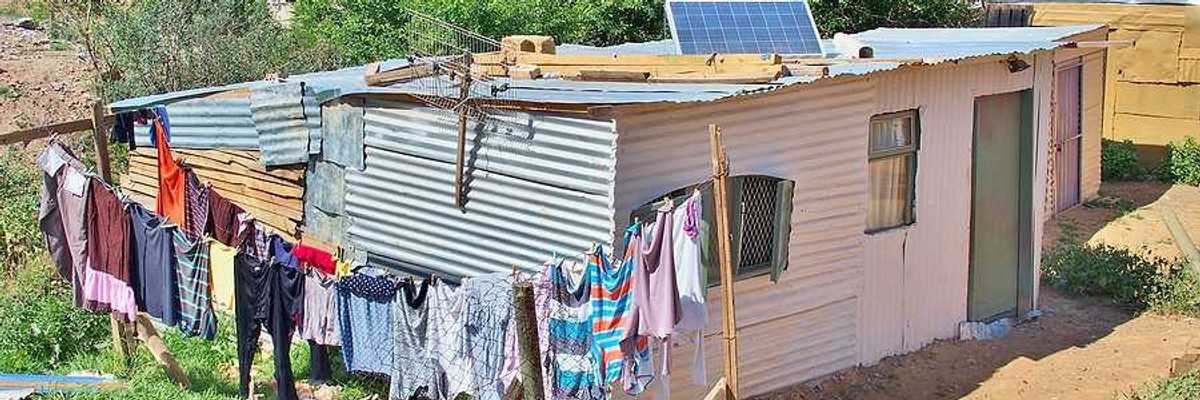opinion
Nicholas Kristof: Climate change’s overlooked impacts on daily life
Rising global temperatures are quietly affecting human health, education, and behavior, not just fueling apocalyptic scenarios.
In short:
- Extreme heat is linked to more accidents, suicides, and violent crimes, as well as worse academic performance.
- Wildfires, exacerbated by climate change, are causing widespread air pollution, leading to thousands of premature deaths yearly.
- Rising temperatures disproportionately affect disadvantaged groups, worsening inequality in education and health.
Key quote:
“The familiar climate catastrophe framing may be missing some of the most important features of the real climate change story.”
— R. Jisung Park, economist at the University of Pennsylvania
Why this matters:
Climate change’s incremental effects are already taking a toll on human well-being. Focusing solely on catastrophic outcomes risks overlooking the current, tangible harm caused by even modest warming, especially among vulnerable populations.
Republicans’ growing distrust in science is a danger to public health
A widening political divide shows Republicans increasingly losing faith in science, raising concerns about the public health impacts of this skepticism, especially as misinformation about vaccines and climate change spreads.
In short:
- Republican distrust in science has surged from 14% in 2020 to 38% in 2023, while Democrats’ confidence has remained relatively stable.
- Misinformation, amplified during the COVID-19 pandemic, has fueled skepticism of vaccines, climate change, and public health measures.
- Political identity, particularly within the MAGA movement, plays a crucial role in shaping these views, exacerbating the partisan gap.
Key quote:
“Americans died because they had read or heard that mRNA vaccines were more dangerous than a bout of Covid.”
— Matthew Dallek, political historian at George Washington University
Why this matters:
Science should be society’s best way of understanding the world, not a pawn in our political battles. The more we politicize it, the more we open the door for denialism to creep in, leaving us all worse off—environmentally and in terms of public health. Read more: America re-discovers anti-science in its midst.
Reimagining energy: The rise of free solar power
A solar revolution is underway, with experts predicting that by 2030, solar power could be effectively free during daylight hours in many regions.
In short:
- Solar energy capacity saw an 80% increase in 2023, now providing nearly 6% of global electricity, with expectations to become the dominant source by the 2030s.
- The cost of solar panels has dropped dramatically, making solar the cheapest new electricity source for 95% of the world.
- The future may bring industries that adjust operations based on solar availability, with a growing focus on energy storage and transmission.
Key quote:
“The next tenfold increase will be equivalent to multiplying the world’s entire fleet of nuclear reactors by eight in less than the time it typically takes to build just a single one of them.”
— The Economist
Why this matters:
With fewer fossil fuels being burned, we could see a dramatic drop in pollution-related illnesses, cleaner air, and a significant cut in carbon emissions. The challenge now is to figure out how to harness this potential. Read more: Solving the climate crisis requires more than switching to renewables—everyone needs equal access.
Opinion: Building climate resilience fails to protect human health
The Department of Health and Human Services' focus on climate resilience is insufficient to address the extensive health impacts of climate change.
In short:
- The HHS Climate Action Plan emphasizes resilience without adequately addressing prevention.
- Resilience policies overlook the pervasive and constant health threats posed by climate change.
- The approach may lead to accepting climate disasters as inevitable, rather than preventable.
Key quote:
"Resilience is the categorical imperative of business-as-usual; it is crisis managers buying time. For others, resilience is exhausting."
— Ajay Singh Chaudhary, author of The Exhausted of the Earth.
Why this matters:
Focusing solely on resilience without prevention leaves populations, especially the vulnerable, in perpetual danger. This approach risks normalizing climate disasters instead of aiming to mitigate them.
Relevant EHN coverage:
Opinion: Rethinking utility incentives is key to meeting rising US electricity demands
As electricity demand spikes, a shift from traditional fossil fuel plants to renewable energy sources is critical to avoid compromising U.S. climate objectives.
In short:
- Utilities like Duke Energy plan to build more gas-fired plants to meet rising electricity needs driven by digitalization and electric vehicles.
- Innovative solutions such as virtual power plants and enhanced energy efficiency could meet these demands more sustainably.
- Changes in regulatory frameworks are being tested to incentivize utilities to invest in green technologies.
Key quote:
"We need to electrify everything from cars to appliances to slow climate change, but we won’t be able to reach our climate goals if we power all of those machines with dirty energy."
— Jonathan Mingle, independent journalist and the author of “Gaslight: The Atlantic Coast Pipeline and the Fight for America’s Energy Future”
Why this matters:
As demand for electricity increases, the adoption of sustainable practices and regulatory changes could significantly reduce carbon emissions and foster an equitable, modern electric grid.
Opinion: European court's climate ruling holds lessons for action on plastic pollution
A recent landmark decision by the European Court of Human Rights held Switzerland accountable for inadequate climate policies, specifically highlighting the increased risk of heatwave-related deaths among older women. Plastic production is another case where governments have failed to protect vulnerable groups.
In short:
- The climate case focused on collective rights to a healthy environment.
- The ruling opens avenues for future legal actions against governments for failing to protect public health against environmental hazards.
- Plastic production, involving hazardous chemicals, represents a similar negligence, affecting reproductive health and increasing disease risks.
Key quote:
"This...decision is about the right of groups of people to enjoy a 'healthy environment'."
— Sian Sutherland, co-founder of A Plastic Planet
Why this matters:
The climate case underscores the legal leverage that groups can use against governments that neglect environmental health policies. As negotiators meet in Ottawa this week to move toward agreement on a binding agreement to control plastic pollution, it's a timely message. Here's what to know about the fourth round of plastic treaty talks.
Opinion: Reevaluating our methods in pursuit of environmental sustainability
We need to rethink the effectiveness of focusing solely on decarbonization to achieve true sustainability.
In short:
- Technological solutions like decarbonization might not address the deeper social and political issues affecting environmental sustainability.
- Emphasis on reducing carbon emissions often overshadows other environmental concerns such as biodiversity loss and pollution.
- The current strategy of reducing emissions through technological means may neglect the underlying economic and political factors contributing to environmental degradation.
Key quote:
"Technology can, at best, kick conflicts down the road. Peace cannot be engineered."
— Peter Sutoris, environmental anthropologist
Why this matters:
Relying solely on decarbonization to achieve sustainability overlooks several critical aspects of environmental and societal health. Decarbonization primarily focuses on reducing carbon emissions, particularly from energy production and industrial processes, which is undoubtedly essential. However, sustainability is a broader concept that includes economic, social, and environmental balance.









